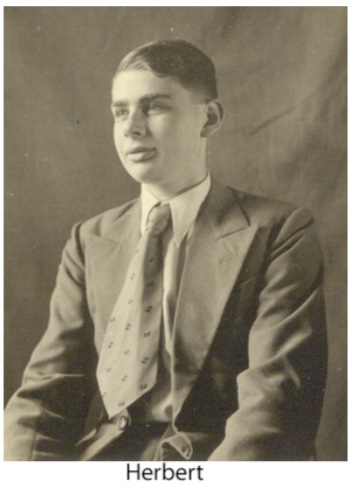Born: Vienna, Austria, 23 July 1920
Profession in country of origin: Student
Arrived in Britain as a refugee from Belgium in 1939
Documents
Male enemy alien - Exemption from internment - Refugee
Surname: Weihs
Forename: Herbert
Alias: -
Date and place of birth: 23/07/1920 in Vienna
Nationality: German
Police Regn. Cert. No.: 711 251
Home Office ref: C 1981
Address: Kitchener camp, Richborough, Sandwich, Kent
Normal occupation: Student
Present occupation: Gardener
Name and address of employer: -
Decision of tribunal: Exempted "C" & 9A
Date 11.10.1939
Whether exempted from Article 6(A): Yes
Whether desires to be repatriated: No
Handwritten later additions:
Released
Interned EC [crossed out]
Embarked 30.05.1940
Herbert Weihs
Released
Embarked 30.05.1940
23.07.1920
711251
Richborough E.C. N13914
Source: National Archives, Home Office: Aliens Department: Internees Index, 1939-1947.
B. Non-transmigrants
Name of ship: Antonia
Steamship Line: Cunard White Star Limited
Names and descriptions of ALIEN passengers embarked at the port of Liverpool
Date of Departure: 30th May 1940
Where bound: Quebec, Montreal
Contract ticket number: 50030/6
Port at which passengers have contracted to land: Montreal
Names of passengers: Weihs, Herbert
Class: 3rd
Ages of passengers - Adults of 12 years and upwards - Accompanied by husband or wife - Males / Females -
Ages of passengers - Adults of 12 years and upwards - Not accompanied by husband or wife - Males 19 / Females -
Children between 1 and 12: -
Infants: -
Last address in the United Kingdom: Kitchener Camp, Richborough
Profession, Occupation, or Calling of passengers: Student
Country of last permanent residence: Foreign Countries
Country of Intended Future Residence: USA
Country of which Citizen or Subject: Germany
Source: National Archives: Passenger Lists leaving UK 1890-1960.
Editor’s note: We are not allowed to reproduce National Archives (UK) images, but we are permitted to reproduce the material from them, as shown above.
B. Non-transmigrants Name of ship: Antonia Steamship Line: Cunard White Star Limited Names and descriptions of ALIEN passengers embarked at the port of Liverpool Date of Departure: 30th May 1940 Where bound: Quebec & Montreal Contract ticket number: 50036 Port at which passengers have contracted to land: Montreal Names of passengers: Weihs, Herbert Class: 3rd Ages of passengers - Adults of 12 years and upwards Not accompanied by husband or wife - Males 19 Ages of passengers - Adults of 12 years and upwards - Not accompanied by husband or wife - Males / Females - Children between 1 and 12: Infants: - Last address in the United Kingdom: Kitchener Camp, Richborough Profession, Occupation, or Calling of passengers: Student Country of last permanent residence: Foreign Countries Country of Intended Future Residence: USA Country of which Citizen or Subject: Germany
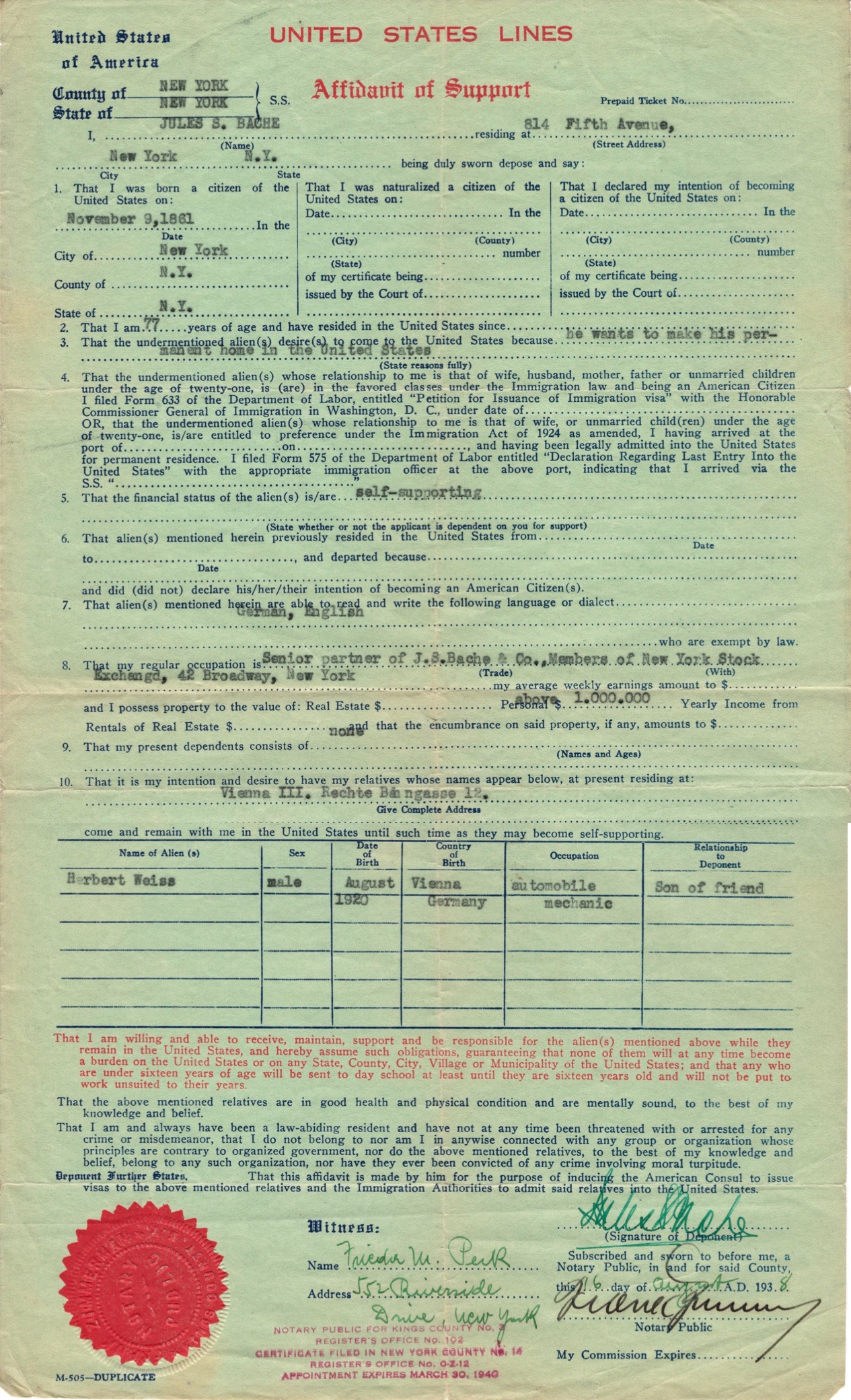
To view the following images, please click to open in enlarged full form

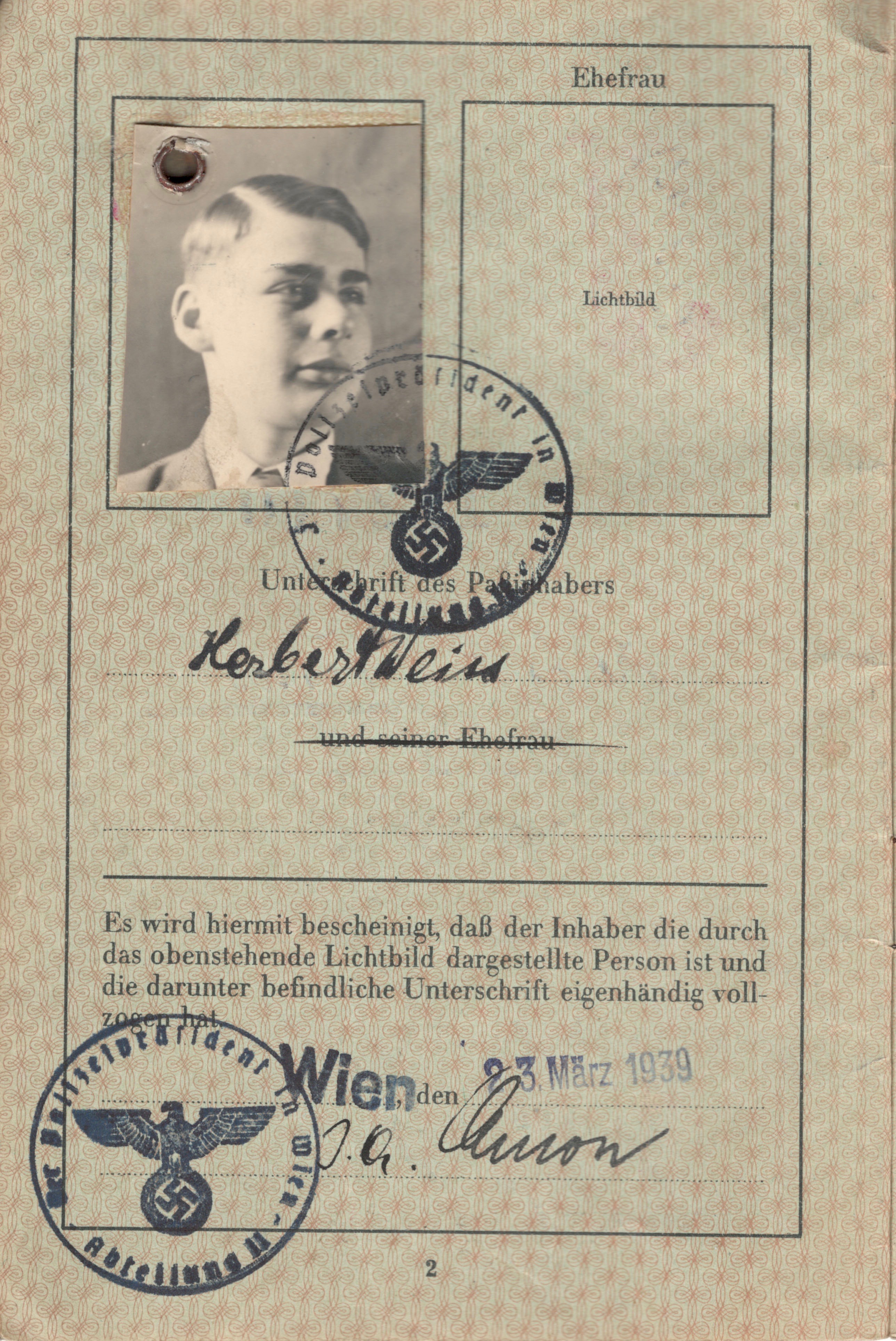
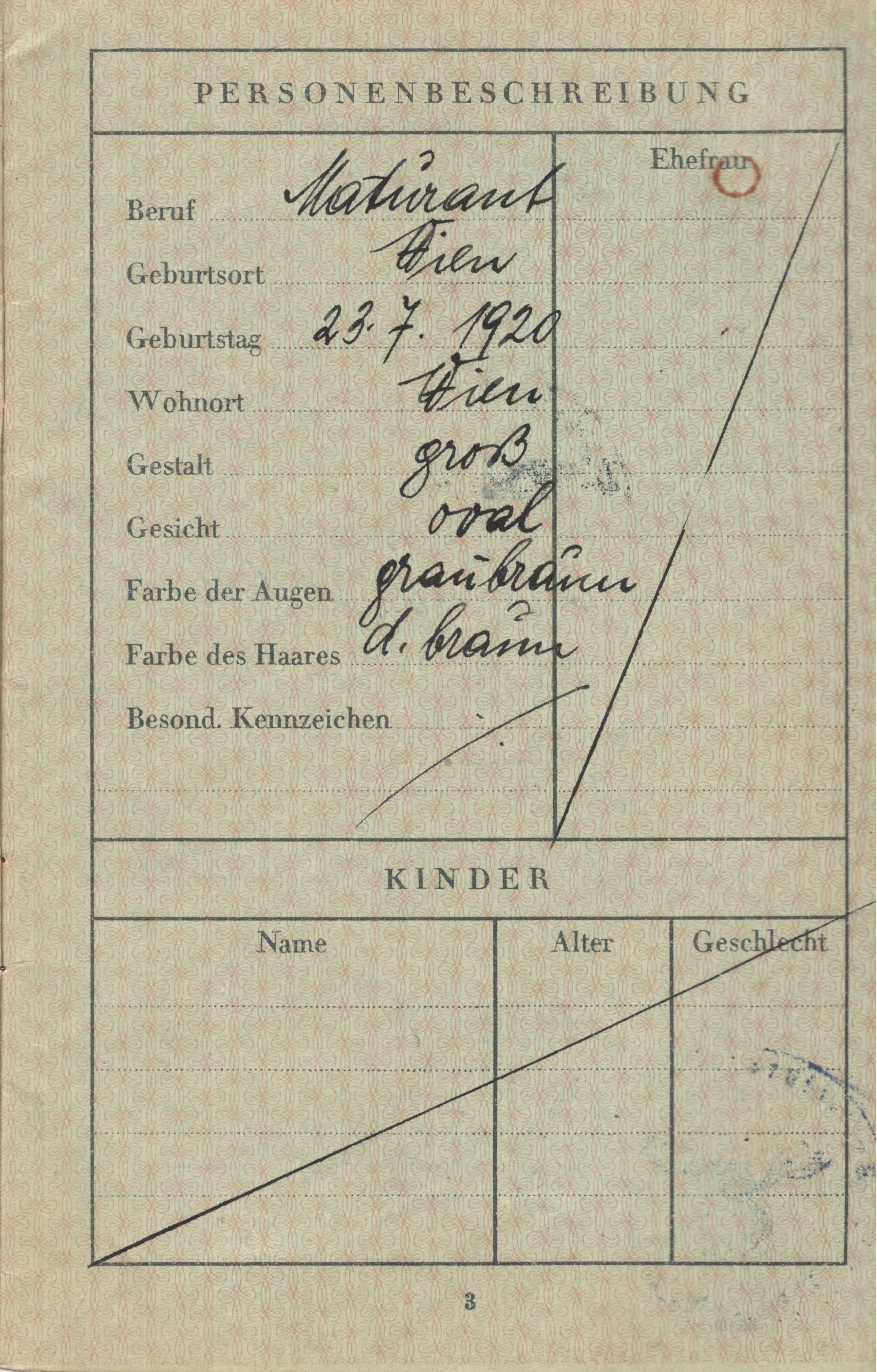
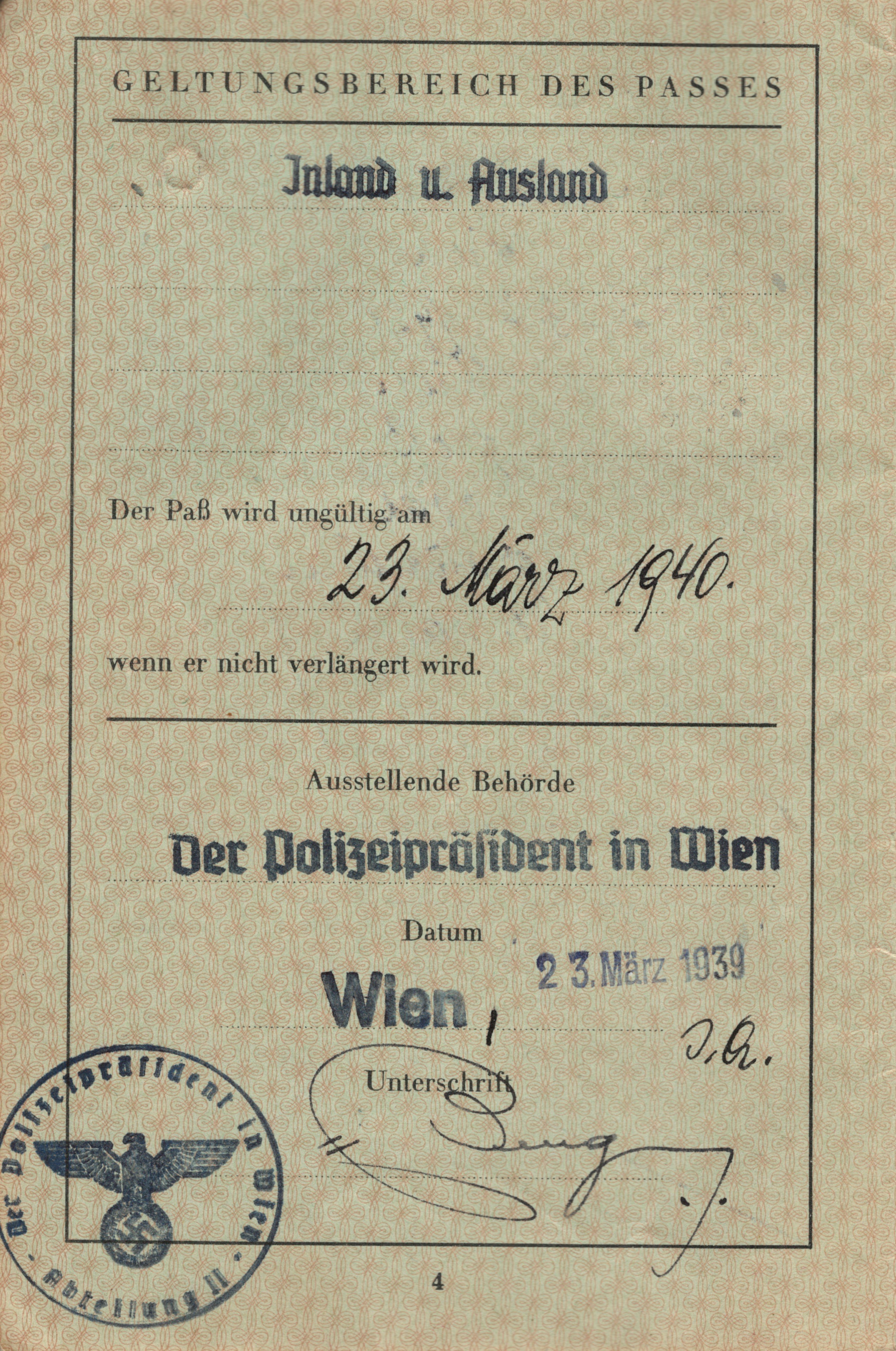
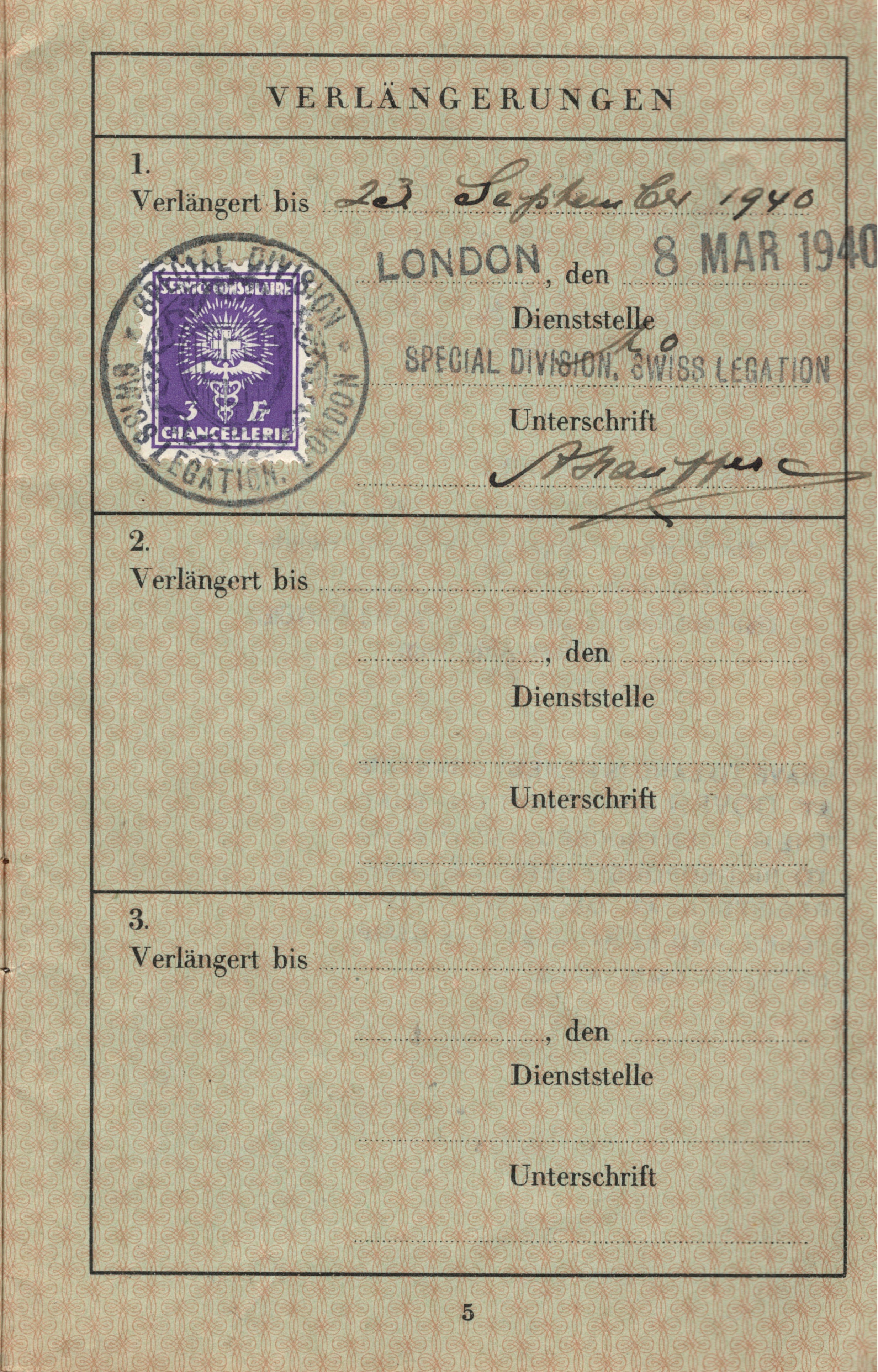
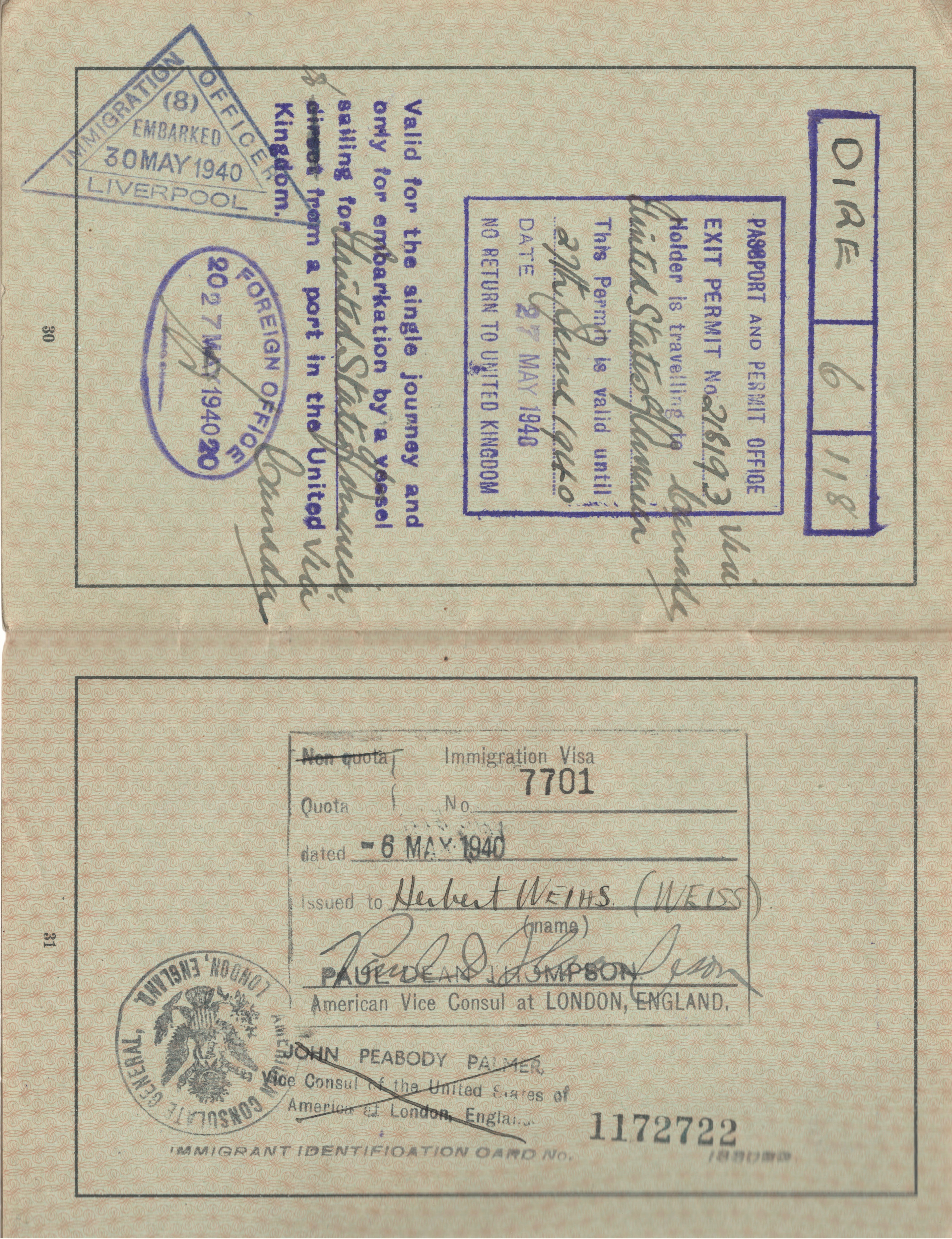
Letters
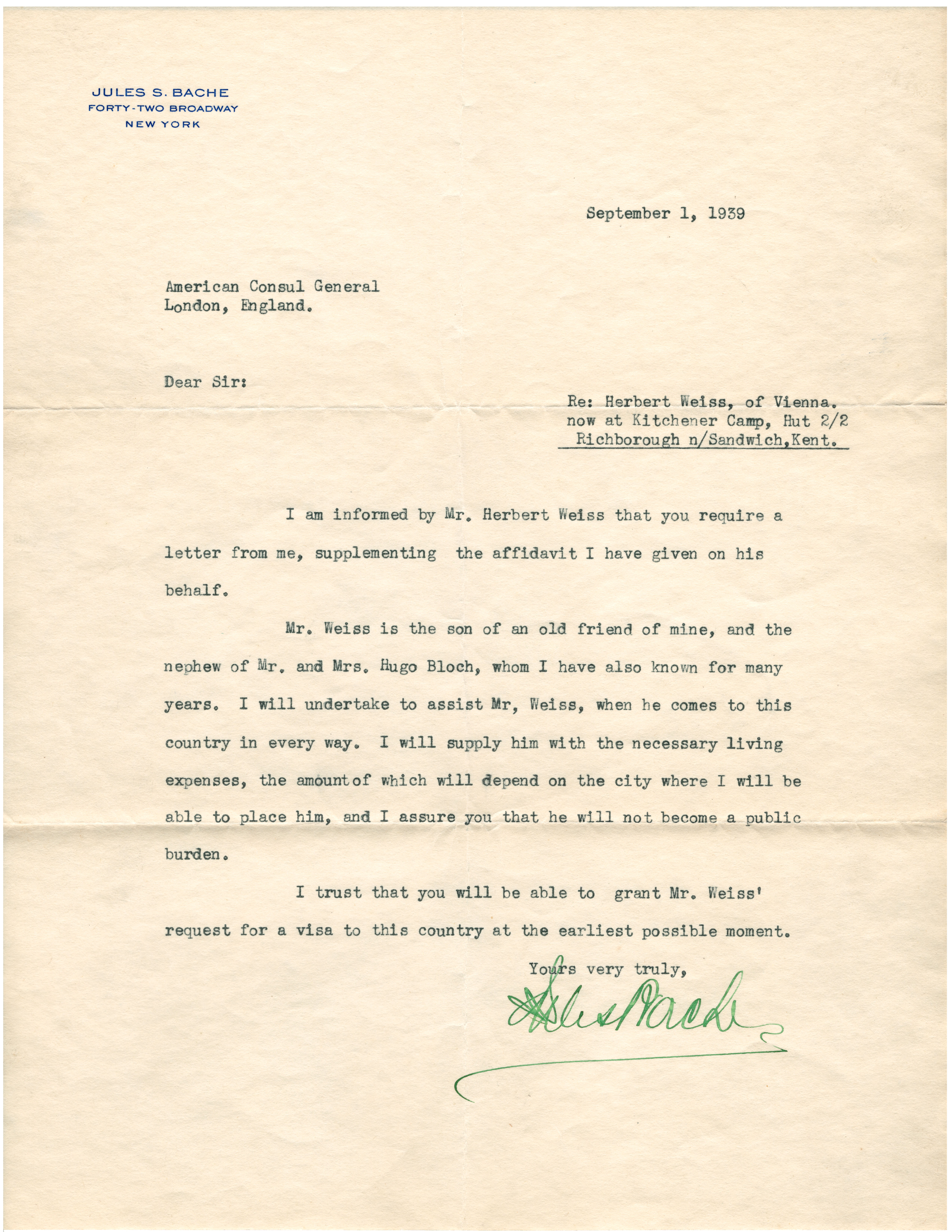
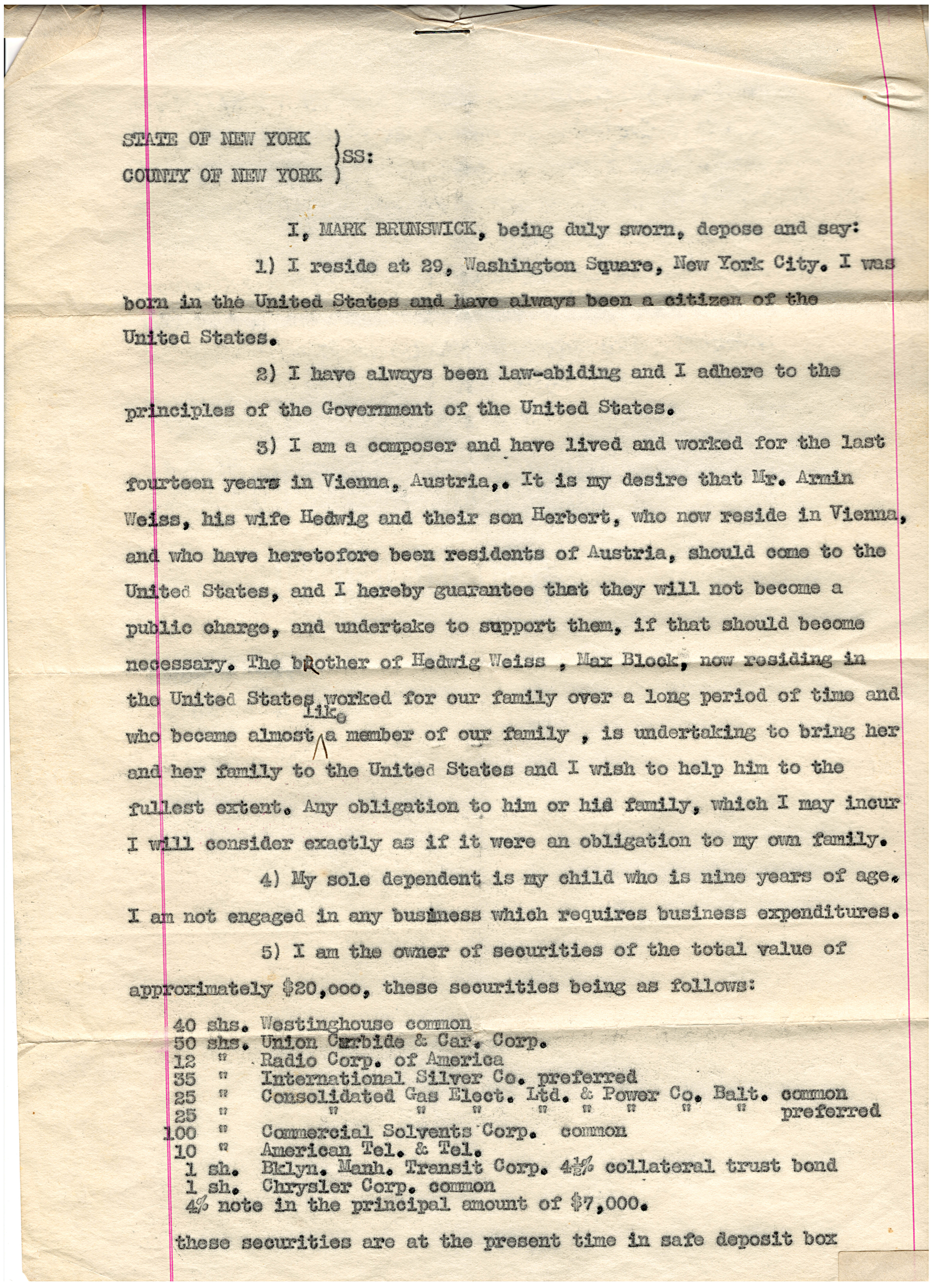
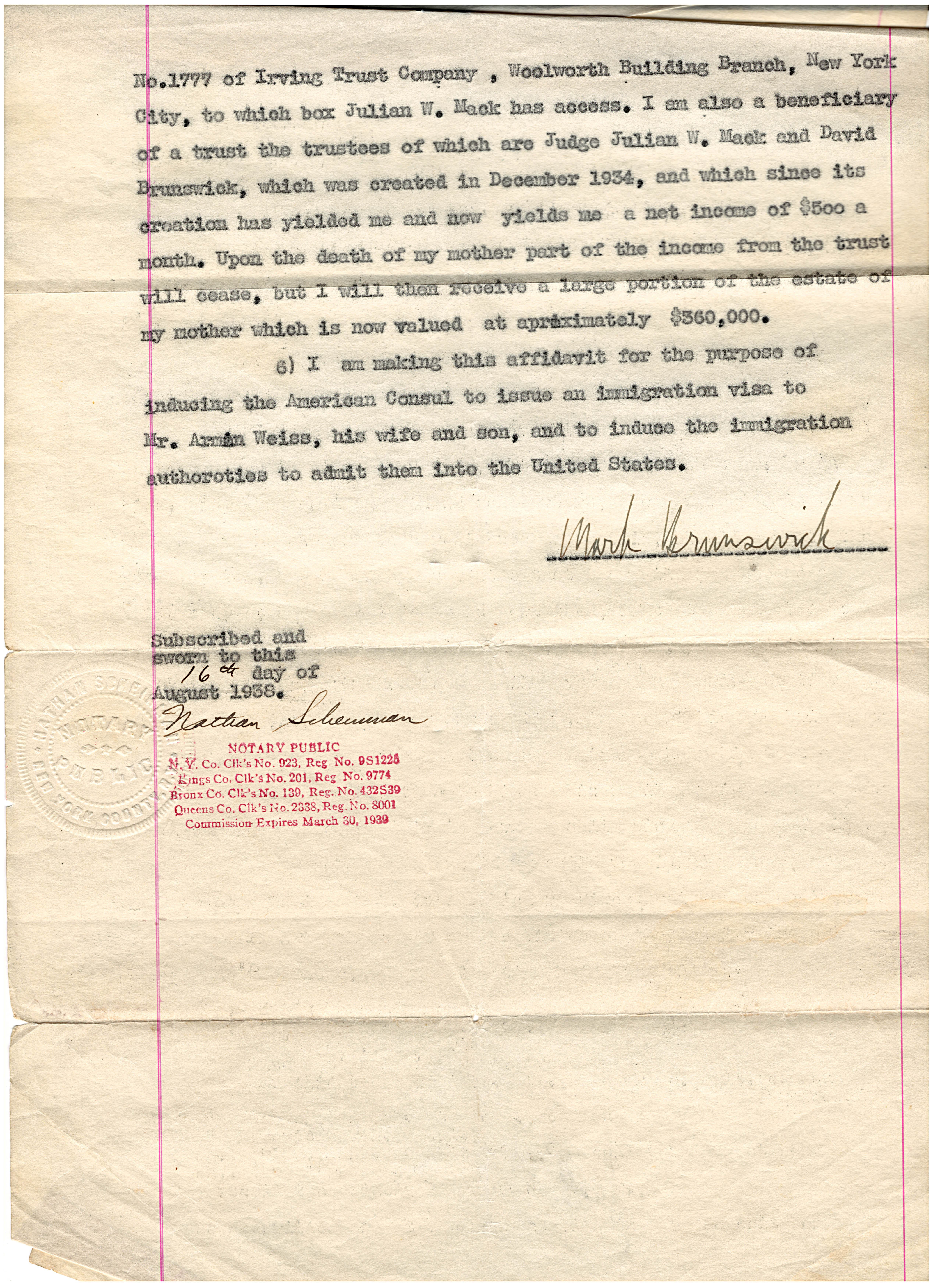
Memories
Autobiography of Herbert Weiss.
It has been my intention to put down in words my experience of life. Now that I am over 80 year of age, the task becomes more urgent if I want to finish it.
I was born on July 23, 1920 in Vienna, Austria and lived in that city until May 1939 in the same apartment in Rechte Bahngasse 12. In the same building were Walter Feistritzer, the janitor’s son and lise Cyganek, both of them my age and my friends. After the German Anschluss, Walter became a Nazi and SA man, which of course ended our friendship. I had two first cousins on my father’s side, Peter (the son of George, my father’s brother), about two years older and Renee (the daughter of Siegfried, the second of my father’s brothers) almost exactly my age. We were also the best of friends and met frequently.
I went to the nearby elementary school in Strohgasse for 4 years and then to the Realgymnasium (the Austrian equivalent of high school) in the Stubenbastei for the required 8 years. My father, who had owned an embroidery factory before the first world war, had to sell it in order to enter the Austrian Army as a lieutenant (since he was a reserve officer). After the war, he found jobs as a bookkeeper and eventually as a salesman of life insurance, nothing to give us luxuries. So we led a rather frugal life.
In high school I was a fairly good student in the subjects of Latin and Mathematics, I was a mediocre one in French and my cousin Franzi Schapira helped me with that language. An aunt of mine, aunt Kathe Bondy who was a teacher of English gave me lessons in that language (which was not the required language in the high school).
As a fairly young boy I joined the boy scouts, together with my cousin Peter, partly under the leadership of Hans Schapira, Franzi’s brother. We went to several summer camps, Litschau, and Fernsee. In 1937 I was advanced to be an assistant group leader of the scout troupe.
My mother’s family was mainly in Czechoslovakia, she had several sisters and brothers and I visited them and their families one Summer in Prag and Teplitz and Karlsbad.
One Summer when I was about 14 I was invited to visit a Hungarian family to speak German to their children, Renee was invited to a different family and we set out together and were picked up at the railroad station with bicycles, which I didn’t know how to ride, but I soon learned.
Then came the various political events in Austria, the failed revolution by the worker’s party, the assassination of the Chancellor Dollfuss and eventually the ultimatum to Chancellor Schuschnik and the German Anschluss in March 1938. Times became very dangerous for Jews; fortunately, our janitor, Mr. Feistritzer, when questioned, denied that Jews lived in that apartment building. My cousin Peter and one of the boy scouts, Paul Brunner escaped by crossing the German-Belgian border into Belgium, where they were assisted by the scouts and housed in a camp in Merxplas. I was in my last year of high school to graduate in May, but in April of that year all Jewish students of our high school were transferred to another Realgymnasium in the 2nd district of Vienna, which had been preponderantly Jewish. I eventually passed the required test and made Matura (graduated) in 1938.
Now came the difficult time of finding a way to leave Austria, because it had become impossible for Jews to live there. Most countries required a financial security which my parents didn’t have. My mother’s brother, Max, who had lived in New York since the first world war, worked for Mr. Brunswick, the owner of a phonograph record company and got him to write the required “affidavit” that we wouldn’t be a burden to the US. Another of my mother’s brothers, Hugo, had a Summer home for people who came to Karlsbad (in Czechoslovakia) for the water cure. One of his tenants was Mr. Jules Bache, the Wall street broker who wrote an affidavit for me. Now, all we had to do was wait for the quota to be supplied with a visa.
After the invasion of Czechoslovakia by the Germans one of my cousins emigrated to England and after realizing that she had left some jewelry behind, came back to Prague and was never heard from again. Only one of my mother’s six sisters and brothers and her family survived, the rest didn’t.
In 1939, England permitted people of my age group, who had to wait for their visa, to go to England and wait there until the quota permitted them to have the visa. So with tears in my eyes I left my parents at the Westbahnhof (West railway station) and went to England by railroad through Belgium and eventually by ship to the coast of England and we arrived in the Kitchener Camp in Richborough, near a town of Sandwich, close to the seacoast towns of Margate and Ramsgate. I was housed together with about 20 other refugees in one of their huts. We were asked to contribute some work, I helped building more huts for future refugees, for which I was paid sixpence per week. This was my first contact with people who had been released from concentration camps and our first knowledge of the terrible life they were forced to lead. Since I was one of the few people being able to speak English I was also asked to be a guide to the English visitors who came to see our camp frequently. For that service I usually received tips. The supervisors of the camp were two brothers with the names of Mays. They also taught us, what they thought were useful things for our future in America or other foreign countries. One of the things they taught us was a song (obviously the words changed slightly maybe due to their attitudes as Englishmen vs Americans): John Brown’s body has a pimple on his nose …
As Europe became engulfed in the war with Germany, the camp of Merxplas was emptied of refugees who were sent to the Kitchener Camp. Among others, my cousin Peter and one of his cousins, Walter Fuerst were sent to our camp and we all volunteered to work with the kitchen and the distribution of food in the dining hall, all for sixpence a week. We were pretty free in the camp, several times a week we walked to nearby Sandwich for “tea and crumpets”. We also took several trips; on one, after borrowing bicycles we went to Canterbury, another time we took the train to London to visit relatives: Who they were, I cannot recall at the moment but one time we visited my cousin Renee. This was also the time of the Blitzkrieg where London was bombed. Eventually, we saw the rockets from the battle of Dunkirk and the decision was made to evacuate the camp. At that time (March 1940), Peter, myself and several other occupants of the camp received our visa to the United States. The camp was transported to the Isle of Man, except the lucky ones with visa and ship tickets, such as myself, who stayed behind in Liverpool to wait for the ship.
For lack of better accommodations we were housed in the police prison where we stayed for a few days. Then dirty and unshaven we entered the ship and soon mixed with the other passengers. This was a convoy with two passenger ships and a cruiser in between to protect us from the prevailing German submarines. Rumors had it that the other ship carried the gold of Holland. Many of the passengers became seasick; I didn’t until one day when I forgot to shave and went back to my cabin at a lower floor and looking into the mirror while the ship shook from end to end, I became sick myself.
We landed in Halifax where the cargoes were unloaded and then went on the St. Lawrence river to Montreal. After a night’s stay at a hotel we went by Greyhound bus to New York. So, contrary to the experience of most immigrants who saw the statue of liberty on their travel to America, I never saw that statue until many years later. My parents had meanwhile arrived in this country in December 1939 and found a position as a “couple” – my father a butler, my mother a cook, in Connecticut. Peter’s parents lived in Washington Heights (NY) and Peter moved in with them while I rented a room owned by their homeowner’s’ relatives two city blocks from them. After a short visit with my parents, Peter and I found jobs in Long Island City at the Murida Hotel – he in the bakery, I as a pot washer. Our salaries were $30 per month and room and board.
My English started improving a bit, although I remember a situation where one of the waitresses was up on a ladder to take some dishes down from the cupboards and said to me: ‘Herbert, will you give me a hand.’ Obviously, that was an idiom I didn’t understand and proceeded to hold her hand full of dishes. On our off hours we went to the beach where we met a Mrs Wertheimer from Vienna and her two daughters Eva and Linda for nice social contacts.
At the end of the Summer I found employment at a zipper factory and later on as an elevator operator, for the minimum wage of 30 cents/hour. I don’t recall exactly about Peter, but he found employment in another state.
My father’s brother, Renee’s father, in Boston asked him and my mother to move there promising him employment. I suspect now that what he had in mind was to work for him, selling insurance. We all moved to Boston, Massachusetts, renting an apartment in the same building as Renee’s parents. Renee lived there too. Unfortunately, my father was almost immediately after our move diagnosed with having tuberculosis and had to go to a sanatorium where he lived for two years and died. My mother and I depended on other relatives of the patients for rides to the place, although I frequently took a bus to it, near Worcester. This country meanwhile was at war with Japan and Germany, but I was released from my duties (partly for a previously broken leg with metal brackets and partly to take care of my mother, who also had a small job taking care of some children in a family). Renee and her fiancé Egon joined the American armed forces.
I got a job in a factory for band-aids and mothballs, and eventually, Peter worked there too until he too joined the American army. I found other employment in a factory making oil filters. All the time, I had hoped to be able to study engineering at night, but the Massachusetts colleges and universities didn’t have any degree programs in their night schools in engineering, which I had intended to study. A Jewish committee advised me to study the two-year course at the Lowell Institute School, MIT’s night school. After graduation I was hired at MIT to help build high-voltage x-ray generators, one of which had been installed at the Massachusetts General hospital, and another one I helped install at the Oncologic Hospital in Philadelphia (today’s Fox-Chase) I studied graduate courses at the Lowell Institute School and Northeastern University at night …
Herbert R. Weiss
Attached is the autobiography of Herbert Weiss. He and his first cousin Peter Weiss were together at Kitchener camp: Herbert arrived first.
In 1940, Herbert and Peter emigrated on the Antonia from Liverpool to Halifax, Nova Scotia.
Only part of the autobiography [see below] deals with Kitchener camp, but the entire document has been uploaded. In 1998, Herbert returned to Vienna on the occasion of the 60th anniversary of his high school graduation. His cousin Peter never returned to Austria or Germany.
Please click here to read the autobiography of Herbert Weiss (opens pdf)
Reproduced here with the kind permission of the Weiss family for Herbert Weiss
Photographs
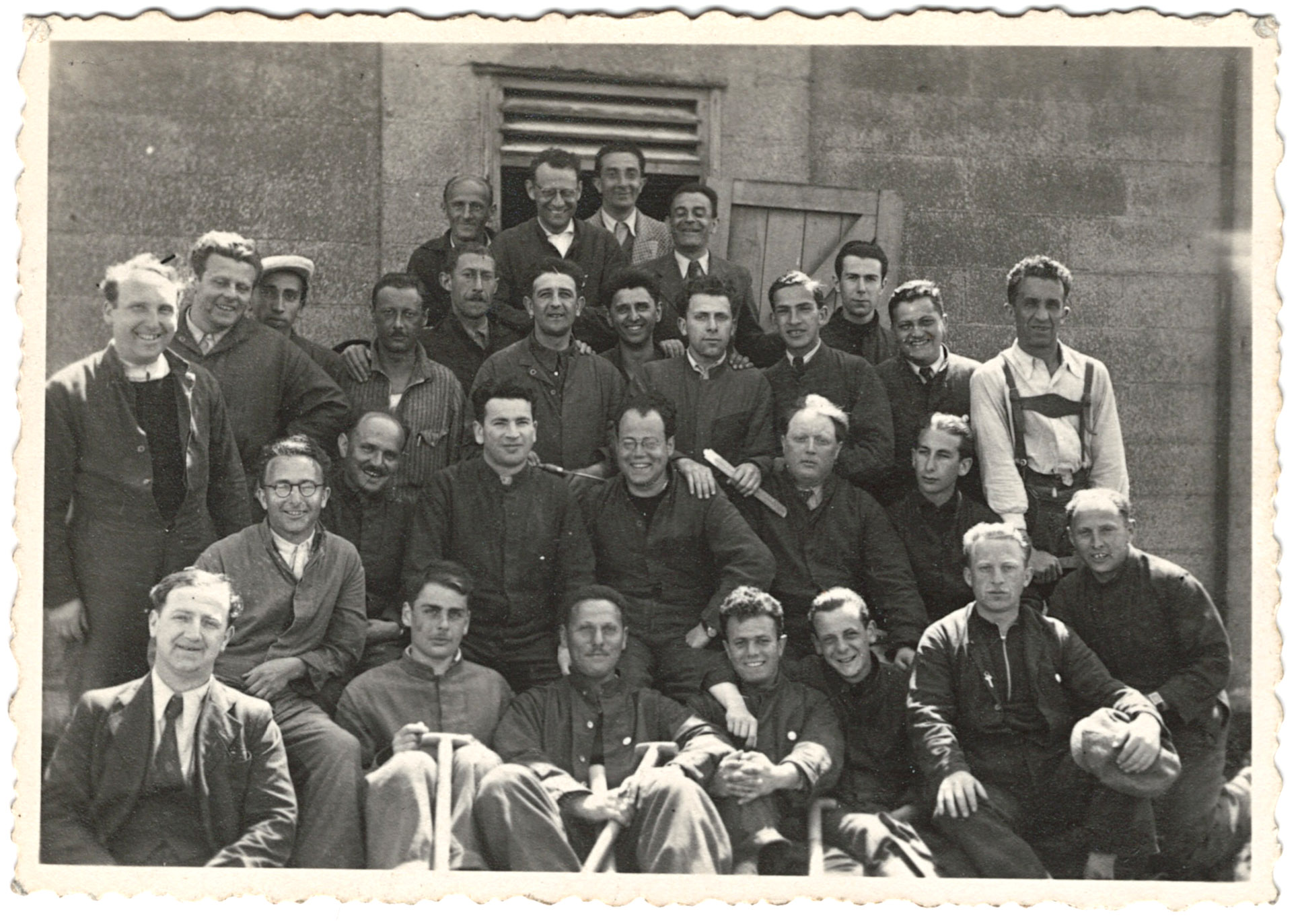
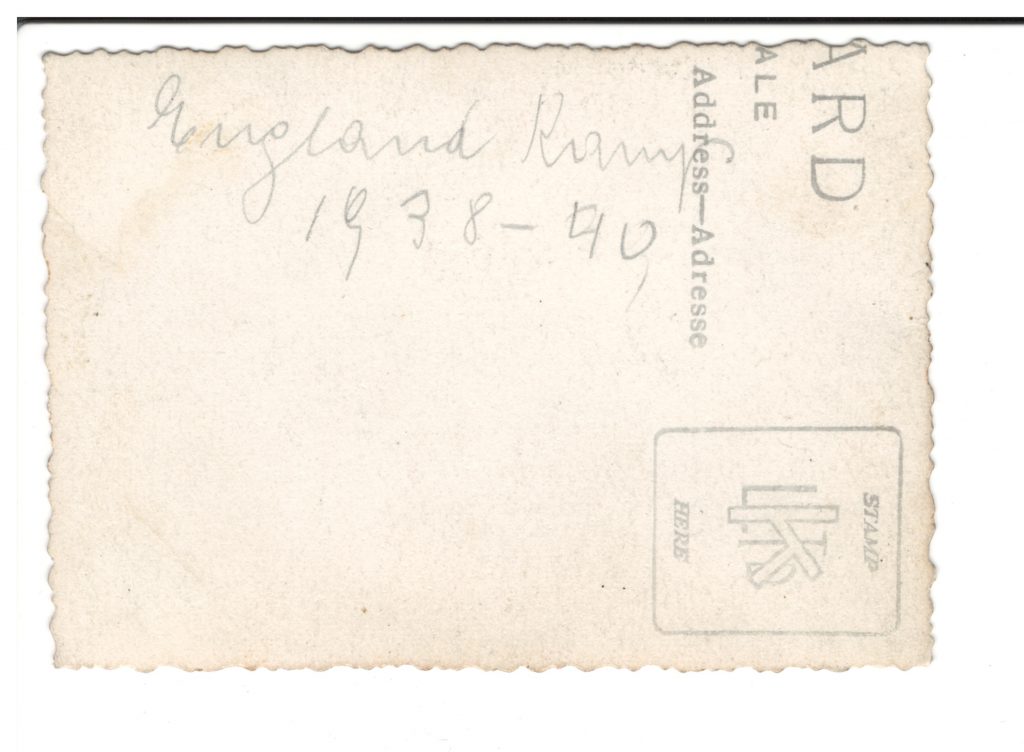
-Photographs submitted with the kind permission of the Weiss family for Herbert Weiss

